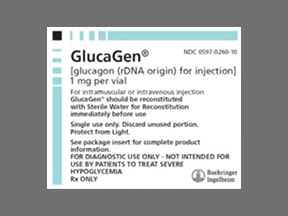
Glucagen Diagnostic Coupons & Savings Card – Discount Prices from $159.13
My prescription
Edit
1MG, Glucagen Diagnostic (1 Solution Reconstituted)
Select pharmacy

CVS
$192.17
COUPON PRICE
Walmart
$159.13
COUPON PRICE
Walgreens
$170.12
COUPON PRICE
Albertsons
$184.59
COUPON PRICEGlucagen Diagnostic savings card
Show this card to your pharmacist
Walmart
$159.13
BIN
ID
PCN
GRP
019876
LHF9EB68C1
CHIPPO
LHX
Powered by
More prescriptions for hypoglycemia
More prescriptions for hypoglycemia
Price history for Glucagen Diagnostic
1 Solution Reconstituted, 1MG
Average retail price for Glucagen Diagnostic
Average SaveHealth price for Glucagen Diagnostic
Our price history data is based on aggregated prescription data collected from participating pharmacies in America. Our prescription data updates daily to reflect the latest price changes. If you notice a missing data point, it means there wasn't sufficient data available to generate a monetary value for that date.
*Retail prices are based on pharmacy claims data, and may not be accurate when we don't have enough claims.
Glucagen Diagnostic dosage forms
Dosage Quantity Price from Per unit 1MG 1 Solution Reconstituted $159.13 $159.13 1MG 10 Solution Reconstituteds $1757.04 $175.70
| Dosage | Quantity | Price from | Per unit |
|---|---|---|---|
| 1MG | 1 Solution Reconstituted | $159.13 | $159.13 |
| 1MG | 10 Solution Reconstituteds | $1757.04 | $175.70 |
Using the SaveHealth discount card, what is the price of Glucagen Diagnostic without insurance?
Using the SaveHealth discount card, the price of Glucagen Diagnostic without insurance is $159.13.
What is the price of Glucagen Diagnostic at CVS?
The price of Glucagen Diagnostic at CVS is $192.17.
What is the price of Glucagen Diagnostic at Walgreens?
The price of Glucagen Diagnostic at Walgreens is $170.12.
What is the price of Glucagen Diagnostic at Walmart?
The price of Glucagen Diagnostic at Walmart is $159.13.
